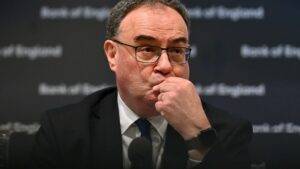
The governor of the Bank of England has acknowledged the challenges faced by policymakers due to unreliable data, expressing a desire for more accurate figures on the unemployment rate.
Andrew Bailey, speaking to an audience in Italy, noted that the UK jobs market appears to be operating close to full employment despite rising borrowing costs, which traditionally tend to elevate the jobless rate in efforts to curb inflation.
“I wish we had a more precise understanding of our unemployment figure in the UK…but it appears that we are at, or near, full employment,” Bailey remarked.
His remarks coincide with the Office for National Statistics reporting a rise in the unemployment rate from 3.8 per cent to 3.9 per cent in January, contrary to forecasts of no change, yet still hovering around historic lows.
The ONS is currently overhauling its labour market survey, addressing declining response rates since the pandemic. This includes reverting to face-to-face interviews and expanding sample sizes to enhance the accuracy of key statistics such as unemployment, employment, and wage growth.
As a result, the Bank has turned to alternative labour market surveys, focusing on indicators like companies’ demand for labour and wage expectations.
Despite expectations that higher interest rates would dampen hiring and lead to layoffs, Bailey noted an “unusual” trend of falling inflation without significant increases in unemployment, observed not only in the UK but also in the US and eurozone.
“This is cautiously positive news. The combination of disinflation with full employment is atypical in our recent history,” Bailey remarked.
Official figures also revealed a decline in wage growth, excluding bonuses, to 6.1 per cent in the three months to January, the lowest since the summer of 2022. The Bank’s monetary policy committee indicated the need for further evidence of slowing earnings growth before considering interest rate cuts later this year.
Bailey emphasized that while the labour market remains robust, “monetary policy is playing its part” in addressing inflation. However, he underscored the necessity for a deeper understanding of the impact of high interest rates on employment and workers.
“Monetary policy is fulfilling its role,” Bailey affirmed. “We cannot expect models to predict events like wars or pandemics accurately. While economics provide frameworks, precise forecasts are elusive. Therefore, it’s imperative to enhance our understanding and modelling of labour markets and investment, especially since the financial crisis.”
Read more:
Britain Approaching Full Employment, Says Bank Governor





